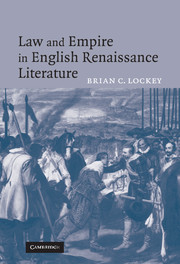Book contents
- Frontmatter
- Contents
- Acknowledgments
- Introduction: Romance and the ethics of expansion
- PART I ROMANCE AND LAW
- PART II THE PREROGATIVE COURTS AND THE CONQUEST WITHIN
- 5 Historical contexts: common law, natural law, civil law
- 6 Roman Conquest and English legal identity in Cymbeline
- 7 Love's justice and the freedom of Brittany in Lady Mary Wroth's Urania part I
- Conclusion: English law and the early modern romance
- Index
5 - Historical contexts: common law, natural law, civil law
Published online by Cambridge University Press: 22 September 2009
- Frontmatter
- Contents
- Acknowledgments
- Introduction: Romance and the ethics of expansion
- PART I ROMANCE AND LAW
- PART II THE PREROGATIVE COURTS AND THE CONQUEST WITHIN
- 5 Historical contexts: common law, natural law, civil law
- 6 Roman Conquest and English legal identity in Cymbeline
- 7 Love's justice and the freedom of Brittany in Lady Mary Wroth's Urania part I
- Conclusion: English law and the early modern romance
- Index
Summary
The combination of admiration, fear, and hatred that England felt for Catholic Spain coincided with a broad ambivalence towards the foreign legal traditions with which Spain was associated, especially the scholastic tradition of natural-law jurisprudence. Natural-law doctrine was necessary to the universal principles on which to construct the future empire, but it was also seen by common lawyers as a foreign threat to the native common law. Precisely for this reason, many common lawyers viewed competing legal traditions that shared an affinity with natural-law doctrine, including the civil law, equity, and the canon law, as essentially foreign to the realm and in some cases, identified them with Rome. Aggravating such tensions, the Roman civil law was at least in theory the law of the land throughout continental Europe. And just as Catholic Spain could apply civil-law principles in the Americas (or elsewhere) in order to evaluate or question the civility of indigenous customs, so too could English civil lawyers potentially use the same principles in order to undermine England's native legal system. Among English common-law jurists, this led to the fear of an internal threat, the fear of what was perceived as a foreign invader but in reality was simply one component of the complex English legal system. In the eyes of such jurists, those competing legal traditions that retained an investment in the natural law and the sovereign's prerogative constituted the paradoxical threat of a “conquest” originating from within the realm.
- Type
- Chapter
- Information
- Law and Empire in English Renaissance Literature , pp. 145 - 159Publisher: Cambridge University PressPrint publication year: 2006



